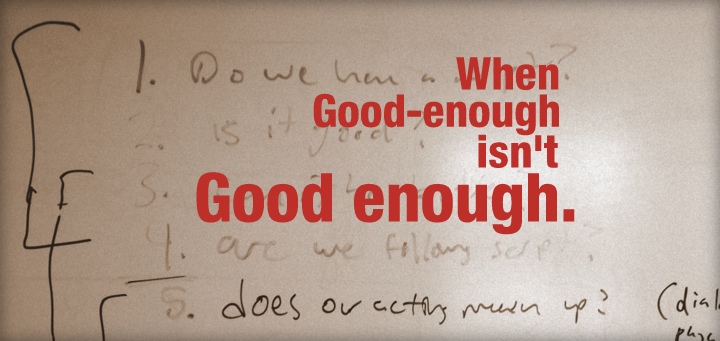In college, I discovered there was a line which, if crossed, could get me from an A- to an A, but that would cost me several hours more of work. I learned how to find that line consistently, and trained myself to be satisfied with good enough on many projects. I called it “The Art of Good-Enough.”
But lately, and especially in my work at SpringHill Camps, I’ve been asking a different question. Instead of asking is this good enough? I’m asking how could this be better?
So, as part of our commitment to getting better every day, we slowed down for a bit this week to evaluate our current Winter Teen Retreat programming with that in mind. How could it be better?
Here are the questions we asked:
- Do we have a script? This is an important question, because we know that when we have a well-thought-out plan, and have considered every word and phrase, we typically do a better job than when we’re winging it.
- Is the script good? This is an important question to ask. What may have seemed good (or good enough) several weeks ago may not seem so good today. Fresh eyes, and detachment from the emotion of our original creation, can allow us to see what we’ve created differently… and perhaps more critically.
- Can it be better? Even if it’s good enough, it’s worth asking this question. It may be more helpful at times to assume it can and just skip to the question How could it be better?
- Are we following our script? Great scripts—and great plans—are only great if we follow them. And what’s even better is when our script provides for all the unforeseen and fluid things that can happen on a live stage and in an ever-changing environment.
- Does our acting measure up? So, let’s assume our script is great. The next phase of evaluation involves a careful look at our execution. Now, this is not an American Idol buzzer or critique, but rather a genuine assessment of how our actors are doing with the material they have. There are a few things that we’ve found that keep our actors from being awesome on stage: not having a script that suits their skills, not having the right props or costumes, and feeling self-conscious about the program in general. By improving the totality of the program, it will allow your actors to really enjoy what they’re doing and really measure up.
- Are we nailing our cues? Lighting, sound, music, entrances and exits… they all add up. And the best joke or most powerful drama loses its impact when we miss these things.
- How are our transitions? Like cues, transitions can make or break a session. There should never be dead air, missing equipment, or straggling musicians. At the end of the day, the best transition is no transition.
- Are we missing any details? Details can make a good program better, and get us past good enough. Having props, equipment, and information ready and in their places will help with the execution of the script, clean up cues and transitions, and give those walking out onto your stage an added degree of confidence.
Our evaluation led us to the conclusion that several elements of our program needed work in various ranges of this list. The first three are about design. Four through six are about execution. And the last two are all in the details.
It looks like our evaluation, and our willingness to go beyond the art of good enough, is going to take us to a better place with our program this weekend.
What program in your church or youth ministry do you need to evaluate this week? Where have you settled for good enough?
